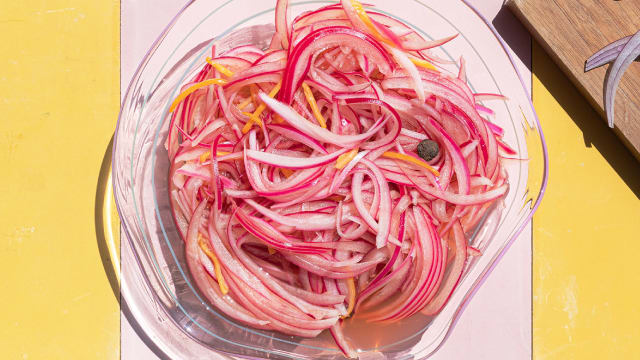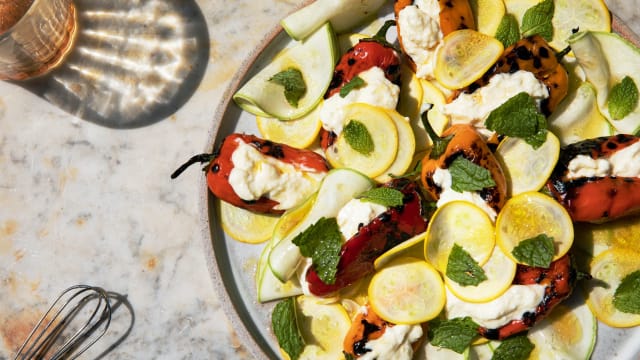Fermented Italian Peppers

Fermented Italian Peppers
Description
Pickled hot peppers can brighten almost any dish, particularly of the lunch-y variety, adding an indispensable combination of hot, sour, and crunchy. Peppers are good sources of carotenoids, and capsaicin promotes endorphins that can boost your mood. But the real gift these peppers give is the result of fermentation, adding a ton of probiotics to your meal.
NOTE
Equipment: 1 qt (1 L) Mason jar with a lid and a fermentation spring or weight that fits.
Equipment:
Ingredients
1 quart MAKES
- 14 oz (400 g) Hungarian wax or hot Italian cherry peppers, seeded and cut into rings (you should have 3 cups)
- 2 cups (480 ml) 3% brine* at room temperature
Directions
-
Step 1
*For this recipe, to make a 3% brine, stir 15 g salt in 500 g (a little more than 2 cups / 480 ml) warm water until dissolved. Note: For safe fermentation, use of a metric scale is highly encouraged. That's why both salt and water quantities are mentioned in grams. -
Step 2
Pack the peppers into the jar, add the weight, and pour in enough brine to cover the peppers by at least half an inch (1 cm). Put the lid on, but loosely so gases can escape. Leave the jar at room temperature for a day or so, then move it somewhere cool (55˚ to 60˚F) for a few weeks. They should start to taste pickled after about two weeks but will improve considerably over a month or longer. -
Step 3
After the two-week mark, do a taste test every week until they are pickled to your liking. When you think they’re irresistible, remove the weight and have at them. Store in the refrigerator, where they’ll last for some time. Enjoy it with sandwiches, pasta salads, antipasto spreads, cheese plates or straight up with a fork. Once the peppers are gone, the spicy brine can enliven vinaigrettes and sauces and be used to make giardiniera or other pickles. (New batches of fermented pickles should generally not be started with brine from mature ferments.)
Explore Recipe Ingredients
About the author
More by Peter Barrett

Beet Salad
This simple salad is almost a quick pickle, using a bright vinaigrette to balance the beets’ earthy sweetness. A bowl of these enhances just about any meal.

Belizean Pickled Onions
This tangy, crunchy, and fiery red onion condiment from Belize brightens up sandwiches or salads

Braised Artichokes
Try this antioxidant-rich recipe of braised artichokes in white wine sauce and dressed in olive oil





